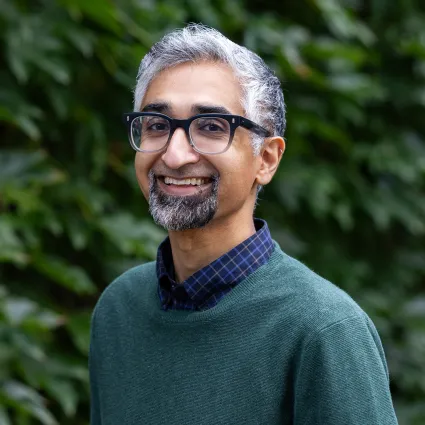Preston Thakral
Assistant Professor of Psychology
Biography
Preston P. Thakral earned his Ph.D. in psychology and neuroscience from Boston College. He is a cognitive neuroscientist who aims to understand how the brain supports episodic memory (i.e., memory for unique events from our personal past). Scientists think of episodic memory not as a video camera that allows us to play a literal recording of a past experience, but instead as a constructive process: we remember only bits and pieces of an event (e.g., the who, what, when, and where) and flexibly link them together rebuilding the original episode (akin to a jigsaw puzzle). This flexibility in memory however makes our memories prone to distortion (akin to forgetting where you parked your car in a garage).
The question that motivates his research program is: Why is episodic memory supported by processes that leave it prone to error and failure?
To answer this question, Dr. Thakral takes an adaptive perspective to studying episodic memory. According to this perspective, the constructive nature of episodic memory which leaves it error-prone also serves a beneficial (i.e., adaptive) role. His research program has indicated that episodic memory – and the cognitive and neural processes supporting it – play a broader functional-adaptive role in supporting other forms of flexible cognition that also rely on constructive processes. Specifically, his research program has shown that constructive memory processes are engaged in helpful ways during tasks that extend beyond simple remembering including certain kinds of imagination, creative thinking, and problem solving. Before coming to Smith, Dr. Thakral was the Director of the Human Neuroscience Laboratory at Boston College. Prior to that, he completed two post-doctoral fellowships, one at the University of Texas at Dallas, and a second fellowship at Harvard University. At Smith, he teaches courses in memory, cognitive neuroscience, and research methods in psychology. He is also the Principle Investigator of the Neuroscience of Memory and Flexible Cognition Laboratory at Smith College. In this lab, his team employs various cognitive neuroscience methods including neuroimaging and neuromodulation techniques to gain insight into the cognitive and neural mechanisms that support episodic memory function and beyond.
Selected Publications
Schacter, D.L. & Thakral, P.P. (2024). Constructive memory and conscious experience. Journal of Cognitive Neuroscience, 36(8), 1567–1577.
Thakral, P.P., Barberio, N.M., Devitt, A.L., & Schacter, D.L. (2023). Constructive episodic retrieval processes underlying memory distortion contribute to creative thinking and everyday problem solving. Memory & Cognition, 51(5), 1125–1144.
Thakral, P.P., Starkey, C.C., Devitt, A.L., & Schacter, D.L. (2023). Are false memory and creative thinking mediated by common neural substrates? An fMRI meta-analysis. Creativity Research Journal.
Thakral, P.P., Yu, S.S., & Rugg, M.D. (2022). Sensitivity of the hippocampus to objective but not subjective episodic memory judgments. Cognitive Neuroscience, 13(3-4), 165–170.
Thakral, P.P., Bottary, R.M., Kensinger, E.A. (2022). Representing the Good and Bad: fMRI signatures during the encoding of multisensory positive, negative, and neutral events. Cortex. 151, 240–258.
Thakral, P.P., Madore, K.P., Kalinowski, S.E., & Schacter, D.L. (2020). Modulation of hippocampal brain networks produces changes in episodic simulation and divergent thinking. Proceedings of the National Academy of Sciences of the United States of America, 117(23), 12729–12740.
Office Hours
Spring 2026
By appointment (please email directly to schedule).
